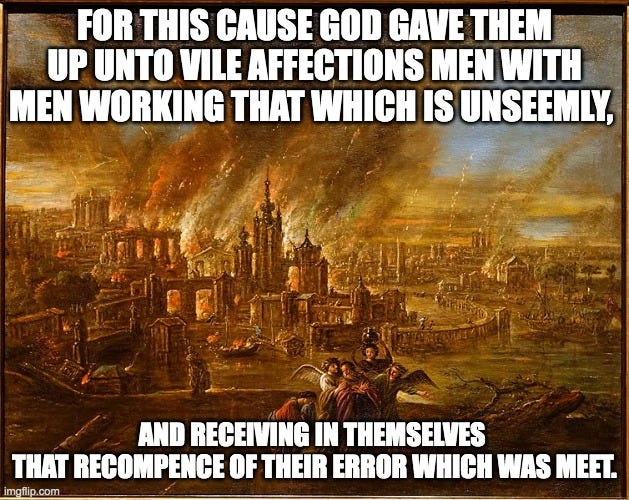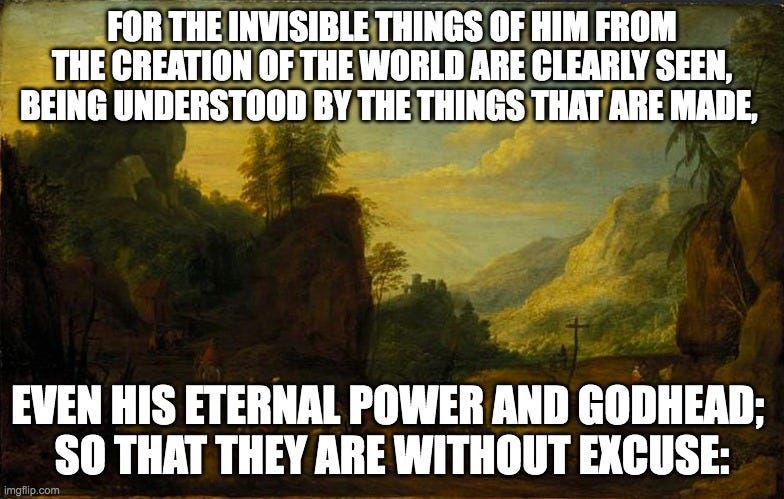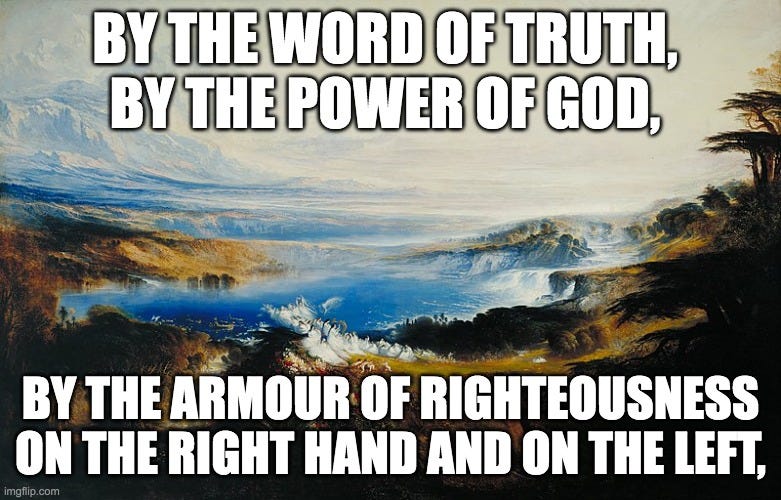Omni-Benevolent by any other name
What is goodness? Or should we ask ‘who is goodness’?
We all have arguments every day about ‘goodness’. Whether we are arguing over facts, or values, or interpretations of facts as they apply to values, pretty much everything that we argue over has its root in some kind of discussion of ‘goodness’.
Even if we ask ‘Is Trump better than Biden’ we have in mind some value system that lets us assign ‘better’ and ‘worse’.
The Nature of God
In response to my recent post ‘The Nature of God’ Addam (with two ‘d’s) took me to task over my use of the term ‘omni-benevolent’:
Your description of omni-benevolent however is incorrect. I know that Christians understand God as the definition of morality, but that specific point is different from omni-benevolence. Benevolent means good. The point about “Omni-benevolence” is the reason there are enormous and unending debates - as I mentioned - about why an “all-good” god allows evil in the world. There are ways to suggest that, because God is all good, that the evil is somehow actually a part of that goodness, and furthermore that because he is good morality can be defined through him, but those are simply interpretations of the implications of the word, not it’s actual definition. My real point being: interpretations other than yours may also be valid.
Addam
But I am afraid that he read my post backwards. He seems to believe that I was describing ‘omni-benevolent’. I wasn’t. I was attempting to describe God:
Another attribute of God that is very relevant to our current exchange, and still more relevant to hundreds of other exchanges that go on every day, is that God is ‘omni-benevolent’. Or, to put it another way, He is the definition of morality. Of right and wrong. Of good and evil.
What this means is that we do not, indeed cannot, have some definition of right and wrong that we bring to the table and then ask oursleves, “Does God conform to this or not.” But rather, does out definition conform to God.
Ex 33:19, Psalm 25:7, Psalm 119:9; Ecc 3:17; I Sam 26:23; Acts 17:3
The difference is rather important. Whenever we attempt to describe something, we are forced to use words for the purpose. And until someone tells me otherwise, the best word I can think of for this attribute is ‘omni-benevolent’.
The Dictionary
The Webster’s 1828 dictionary gives the following definitions:
BENEV'OLENT, adjective [Latin benevolens, of bene and volo.]
Having a disposition to do good; possessing love to mankind, and a desire to promote their prosperity and happiness; kind.
BENEV'OLENCE, noun [Latin benevolentia, of bene, well and volo, to will or wish. See Will.]
1. The disposition to do good; good will; kindness; charitableness; the love, of mankind, accompanied with a desire to promote their happiness.
The benevolence of God is one of his moral attributes; that attribute which delights in the happiness of intelligent beings. 'God is love.' 1 John 4:1.
2. An act of kindness; good done; charity given.
3. A species of contribution or tax illegally exacted by arbitrary kings of England.
These definitions are both lacking in this case because they don’t give us the root or ground of goodness, and that is precisely the question at hand.
Is God the Judge, or is God the Judged
We will leave aside, for a minute, the silliness of people who attempt to judge a God that they don’t believe exist. Here I wish to deal with the question of the relationship between goodness and God. Does goodness exist as a standard, against which we can measure God? Or is God the standard and sources of goodness.
And just to be clear, we are talking about every kind of goodness. Thus wisdom, logic, righteousness, love, joy, etc. The Christian view is that God is the foundation, source and standard for all of these. Thus if you come up to a Christian and say, “I think that your god did a bad thing here” you are speaking illogically in at least three different ways. One of which is that you are saying that a meter is not a meter long.
It may well be that we read of some action of God and we don’t understand why it is good. But the Christian realises that this is his problem, not God’s problem.
Conclusion
I await someone giving me a better term for this particular attribute of God. I am not stuck on ‘omni-benevolent’. But I am stuck on the idea that what I am trying to do here is to describe God, not define ‘omni-benevolent’.
And I am also attempting to build a foundation for a discussion of who God is, as part of the discussion of why male on male sexual activity is wrong. It may seem like going a long way back, but sometimes you have to do that.
Thank you for reading Von’s Substack. I would love it if you commented! I love hearing from readers, especially critical comments. I would love to start more letter exchanges, so if there’s a subject you’re interested in, get writing and tag me!
Being ‘restacked’ and mentioned in ‘notes’ is very important for lesser-known stacks so… feel free! I’m semi-retired and write as a ministry (and for fun) so you don’t need to feel guilty you aren’t paying for anything, but if you enjoy my writing (even if you dramatically disagree with it), then restack, please! Or mention me in one of your own posts.
If I don’t write you back it is almost certain that I didn’t see it, so please feel free to comment and link to your post. Or if you just think I would be interested in your post!
If you get lost, check out my ‘Table of Contents’ which I try to keep up to date.
Thanks again, God Bless, Soli Deo gloria,
Von
Links
The Nature of God
Who is God? What is He like? Introduction This post is written as part of an exchange with Addam as a part of a new series of letter exchanges. This particular exchange began in reaction to a post explaining how he didn’t believe in God, and hated him. At least that is the way I read it.
Pizza Discussion
The “Pizza Discussion” is a letter exchange with
Fallible Father. In it we discuss issues of the importance of religion, God, and morality… comparing them to the importance of Pizza and Sushi. It started when he posted a post entitled ‘Religion’ and specifically comes from this line: “Arguing over religion strikes me as the same as arguing over whether sushi or pizza is better.”
has also contributed.









In the (rather long) comment thread to this post, Addam brought up the question of 'genocide'. Now there is some question as to the definition he was using at the time but, just to be very clear, the actual Christian cannot rule out 'genocide' (ie the physical destruction of an entire people group) by God as a 'good' thing. After all, our children routinely colour pictures of Noah's ark.
Let us be very clear on what God did at the time of Noah. He wiped out, by drowning, every single people group on the fact of the planet except for one particular family. All of them. Man, woman, and child. Goats and Cows. Pigs and chickens. Obliterated.
And if someone were to go to the New Testament and seek for a kinder, gentler God; let us remember that Christ told stories about how God the Father wiped out whole cities when their rulers refused to attend a wedding.
If you are going to use your own conception of morality in order to accuse God of crimes, you will have a lot of ammunition. The question of the floor is, do we get to use our own morality? Are we the sources of moral understanding?
https://vonwriting.substack.com/p/pizza-sushi-and-the-definition-of
Based on the definitions you provided, it seems that we entirely agree about what omni-benevolent means. The definitions aren’t lacking, as you suggested, the word simply doesn’t mean what you want it to mean. That doesn’t mean your point is incorrect, but it does mean your point cannot be defended by appealing to the more agreed upon idea that god is benevolent. That said, I agree that it’s silly for me to argue about the nature of a god which I don’t believe in. As I said in my essay, I’d really rather not.
The fact that you are Christian does not make anything that I’ve said illogical, and this is really my main issue with you at this point. You really seem to think that your mere beliefs are somehow the foundation of logic itself, and that’s just not how rationality works. I wish you’d look away from your beliefs for just a second to try and see the world from my point of view - as I’ve tried to do for you - just for the sake of a healthy conversation. You seem to have plenty of time to be writing these essays, so it’s hard to feel like you’re not just evading the real questions I brought up in my essay.